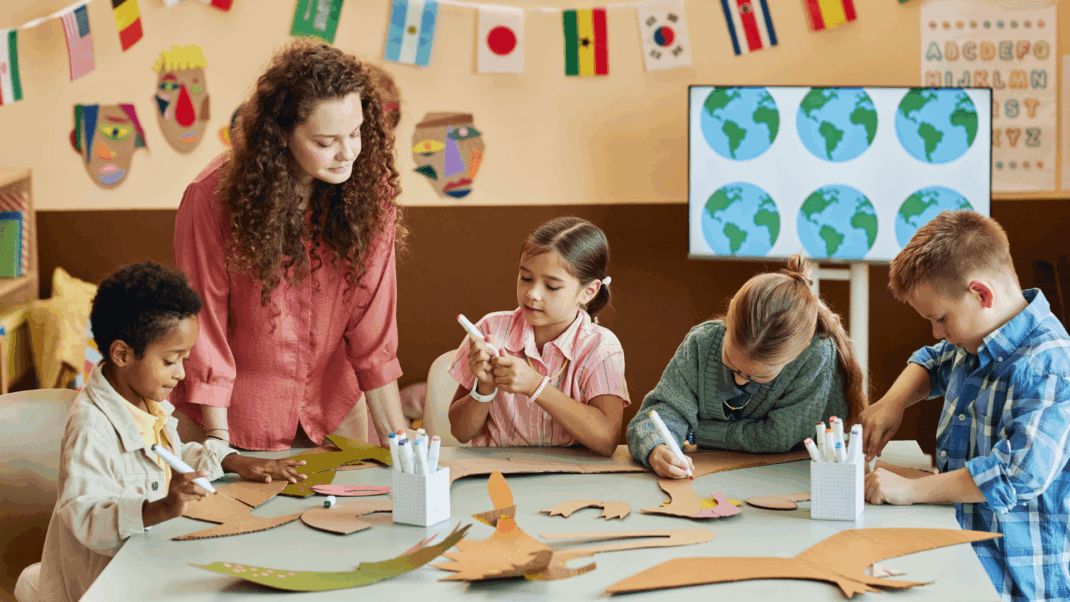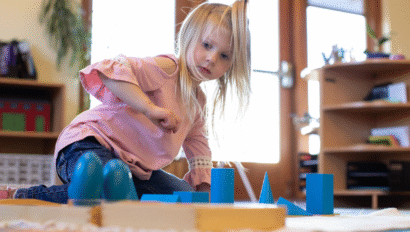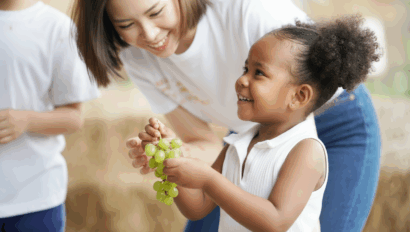Celebrating the Season: Montessori-Friendly Ways to Share Holiday Traditions with Children in Colorado

Quick Answer
In Montessori classrooms, holidays are opportunities for children to connect with culture, geography, and humanity — not just decorations or parties. By focusing on meaning, respect, and hands-on exploration, Montessori teachers help children appreciate global traditions, fostering empathy, curiosity, and peace from an early age.
Why Do Montessori Classrooms Teach About Global Holiday Traditions?
Dr. Maria Montessori believed that understanding our world begins with connection. By learning about global celebrations, children begin to see that while traditions may look different, the feelings behind them — joy, gratitude, and togetherness — are universal.
Many Montessori classrooms approach these lessons the same way museums do: by giving children the chance to experience culture through all their senses. Inspired by ideas like those shared by the Children’s Museum of Richmond, children might explore traditional decorations, taste new foods, listen to festive music, or create art that reflects how families express celebration around the world.
These moments spark empathy and curiosity — helping children appreciate both their own family’s traditions and the diverse ways others share love and light.
How Are Holidays Celebrated in a Montessori Way?
Montessori teachers approach holidays as real cultural studies rather than themed classroom parties. Everything ties back to geography, art, language, and Practical Life. Here’s how these lessons come alive:
- Mapping the World: When learning about a holiday, children locate the country on a globe or world map and explore its culture, language, and customs.
- Storytelling and Books: Teachers read stories, share family traditions, or invite parents to speak about their celebrations. This helps children make personal, meaningful connections.
- Arts and Crafts with Purpose: Children might make diyas for Diwali, paper lanterns for Lunar New Year, or ornaments inspired by Scandinavian designs — always with cultural context and respect.
- Cooking and Food Experiences: When appropriate, children might safely prepare or taste foods that represent a holiday, like baking bread for Kwanzaa or preparing fruit trays for Ramadan.
- Music and Language Exploration: Listening to traditional songs or learning simple greetings in another language introduces children to the rhythm and joy of different cultures.
- Practical Life Activities: Decorating, baking, or preparing gifts for family and friends teaches children about community and giving — core Montessori values.
Every celebration is calm, purposeful, and child-led — woven naturally into the flow of the day rather than breaking the Montessori routine.
How Does This Support Inclusion and Respect?
Montessori classrooms are built on the principle that every child’s culture matters. When we include a variety of traditions throughout the year, every child sees their family represented and respected.
Teachers are intentional about balance — no single holiday dominates. Instead, holidays are introduced as windows and mirrors: windows to see how others live, and mirrors to reflect a child’s own culture and identity.
The American Montessori Society emphasizes that this inclusive, anti-bias approach helps children develop empathy, critical thinking, and a lifelong appreciation for diversity. You can read more about AMS’s guidance on inclusion and peace education on their official resource page.
What Are Some Montessori-Friendly Activities for Home?
Families can easily extend these ideas at home — no fancy materials needed. Try:
- Reading multicultural holiday books together (like Children Just Like Me: Celebrations!)
- Creating a “World of Light” art wall featuring symbols of light from different cultures
- Cooking a dish from another country and talking about what people might be celebrating there
- Listening to music from a holiday you don’t celebrate and learning what it means to others
- Talking about gratitude and kindness as universal traditions, not just holiday themes
These small, intentional moments help children see that learning about others doesn’t take away from their own traditions — it adds to them.
Why It Matters for the Whole Child
Montessori education is about more than academics; it’s about nurturing the whole child — heart, mind, and hands.
When children explore global traditions, they practice curiosity, respect, and gratitude in real life. They learn that while we may speak different languages or celebrate in different ways, we all share the same hope for joy, peace, and connection.
That understanding, built through everyday experiences, is what Montessori calls “education for peace.”
Frequently Asked Questions
How do Montessori schools decide which holidays to introduce?
Teachers often base their choices on the cultural backgrounds of the families in their community, as well as globally recognized holidays that reflect universal values. The goal is balance and authenticity — not covering every holiday, but doing each one with care.
How does this fit into the Montessori routine?
Celebrations are woven into existing areas like Practical Life, Geography, and Cultural Studies. Routines stay predictable, helping children feel secure even during festive times.
What if our family doesn’t celebrate certain holidays?
That’s perfectly okay. Montessori classrooms focus on learning about traditions, not practicing them. Every child’s background is honored equally, and participation is always about curiosity, not conformity.
How do you ensure holidays are taught respectfully?
By emphasizing real cultural meaning, accurate representation, and family voices. Many Montessori guides use AMS anti-bias frameworks to guide planning and conversations.
Bringing It All Together
At Adventure Montessori, we honor global traditions as part of helping children become compassionate, curious, and peaceful citizens of the world. Through storytelling, hands-on exploration, and family collaboration, we make space for every child to see the beauty in their own culture and the world around them.
We’d love to share how our Montessori classrooms celebrate curiosity and culture all year long. Schedule a tour at Adventure Montessori in Colorado to see how we help children learn about peace, respect, and global connection — one celebration at a time.


